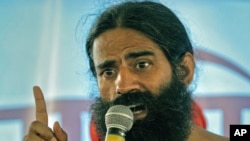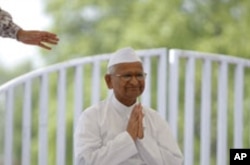Two high-profile, populist anti-corruption leaders are grabbing headlines again in India, but with very different rhetoric. One, a celebrity yoga guru whose New Delhi protest was harshly disbanded by police a few days ago, warns that his followers will fight back in the future. The other is an elderly activist on a one-day hunger strike, who called for calm.
India's wealthiest and most famous yoga guru, Baba Ramdev, issued a warning with militant overtones as he condemned the government for heavyhanded police tactics.
He said he will train thousands of young followers and give them weapons. Alluding to a famous battle from the Hindu Ramayana epic, he said all will see what happens next time.
Use of force
Police broke up Baba Ramdev's public hunger strike in the pre-dawn hours Sunday, storming the New Delhi venue with batons and tear gas. They whisked him 200 kilometers away to Uttarakhand state, saying the number of followers at his gathering in the capital far exceeded the 5,000-person permit he was issued for a yoga camp.
The police action has drawn widespread criticism as an excessive use of force, but government officials have defended it as a necessary security precaution.
Ramdev already is a well-known public figure in India, presiding over a lucrative empire of yoga-related media and food items. He has sharply escalated his profile in recent weeks, however, by invoking India's Gandhian tradition of fasting to evince political change.
Hunger strikes, threats
The hunger strike he began Saturday is part of a broader campaign begun in April by 73-year-old activist Anna Hazare for robust anti-corruption steps at every level of government. The movements may have helped to spur what Indian Defense Minister A.K. Anthony characterized as a "transparency revolution" in India.
Ramdev's threat to respond violently to future police action is a sharp departure from the rhetoric of Hazare, who staged his own one-day fast in the Indian capital.
Hazare told followers they have to be successful in the second battle for India's freedom, and those who join the struggle must be prepared to take insults, but keep in mind Gandhi’s message and follow his path.
Pervasive corruption charged
Corruption is widely seen in India as the country's most pressing problem. Flagrant scams in real estate and telecommunications are blamed for robbing billions of dollars from the Indian treasury, and many ordinary Indians can recount situations in which they felt pressured to pay bribes.
Senior officials in India's ruling Congress Party accuse Ramdev of being a frontman for hardline Hindu nationalist factions. And they have criticized Hazare for using moral blackmail to shortcut the usual democratic process.
Both popular leaders respond that they have waited decades for the government to take concrete action on corruption, and that only direct public pressure can produce results. Hazare warns that if the government does not pass a sweeping anti-corruption bill by August 15, he will resume his hunger strike the following day.





